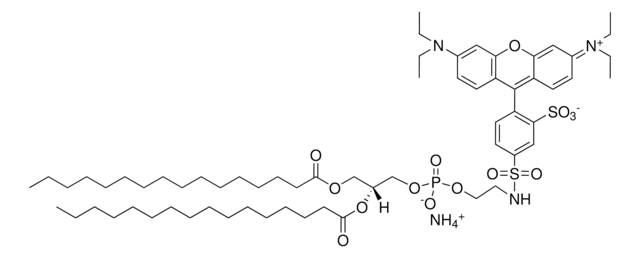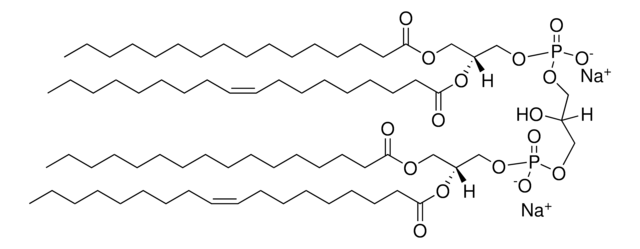840034C
Avanti
16:0-18:1 PS (POPS)
Avanti Research™ - A Croda Brand
Synonyme(s) :
1-hexadecanoyl-2--(9Z-octadecenoyl)-sn-glycero-3-phospho-L-serine (sodium salt); POPS; PS(16:0/18:1(9Z)); 110669
About This Item
Produits recommandés
Description
1-palmitoyl-2-oleoyl-sn-glycero-3-phospho-L-serine (sodium salt), chloroform
Pureté
>99% (TLC)
Forme
liquid
Conditionnement
pkg of 1 × 1 mL (840034C-10mg)
pkg of 1 × 2.5 mL (840034C-25mg)
pkg of 2 × 4 mL (840034C-200mg)
pkg of 5 × 4 mL (840034C-500mg)
Fabricant/nom de marque
Avanti Research™ - A Croda Brand
Concentration
10 mg/mL (840034C-10mg)
10 mg/mL (840034C-25mg)
25 mg/mL (840034C-200mg)
25 mg/mL (840034C-500mg)
Type de lipide
cardiolipins
phospholipids
Conditions d'expédition
dry ice
Température de stockage
−20°C
Chaîne SMILES
[H][C@@](COP([O-])(OC[C@](C([O-])=O)([H])[NH3+])=O)(OC(CCCCCCC/C=C\CCCCCCCC)=O)COC(CCCCCCCCCCCCCCC)=O.[Na+]
Conditionnement
Informations légales
Souvent commandé avec ce produit
Mention d'avertissement
Danger
Mentions de danger
Classification des risques
Acute Tox. 3 Inhalation - Acute Tox. 4 Oral - Aquatic Chronic 3 - Carc. 2 - Eye Irrit. 2 - Repr. 2 - Skin Irrit. 2 - STOT RE 1 - STOT SE 3
Organes cibles
Central nervous system, Liver,Kidney
Code de la classe de stockage
6.1C - Combustible acute toxic Cat.3 / toxic compounds or compounds which causing chronic effects
Classe de danger pour l'eau (WGK)
WGK 3
Point d'éclair (°F)
Not applicable
Point d'éclair (°C)
Not applicable
Certificats d'analyse (COA)
Recherchez un Certificats d'analyse (COA) en saisissant le numéro de lot du produit. Les numéros de lot figurent sur l'étiquette du produit après les mots "Lot" ou "Batch".
Déjà en possession de ce produit ?
Retrouvez la documentation relative aux produits que vous avez récemment achetés dans la Bibliothèque de documents.
Les clients ont également consulté
Notre équipe de scientifiques dispose d'une expérience dans tous les secteurs de la recherche, notamment en sciences de la vie, science des matériaux, synthèse chimique, chromatographie, analyse et dans de nombreux autres domaines..
Contacter notre Service technique



















